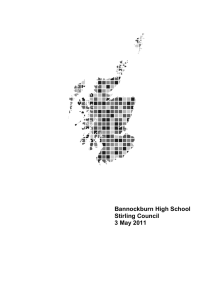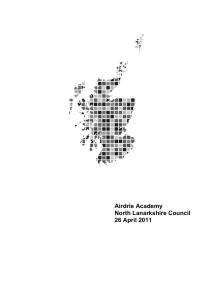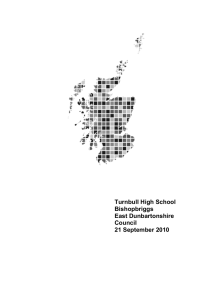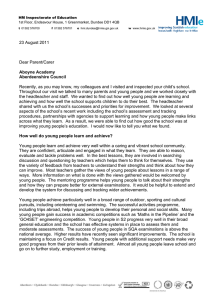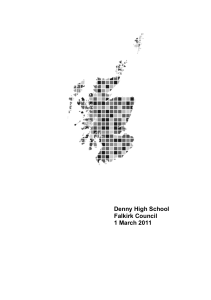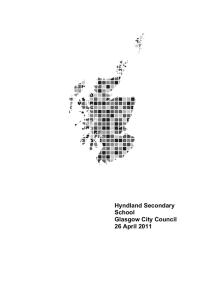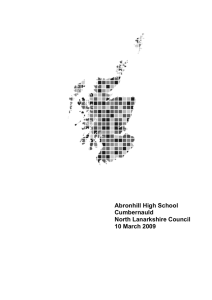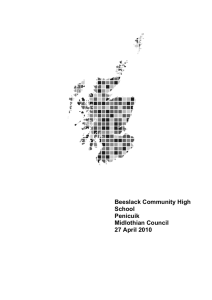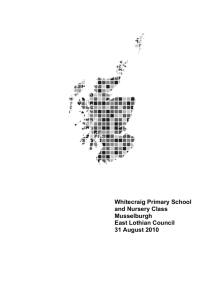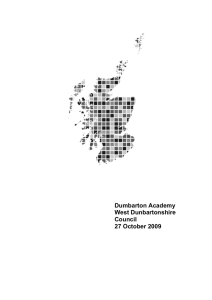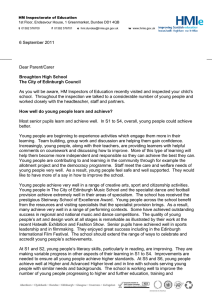Douglas Academy Milngavie East Dunbartonshire
advertisement
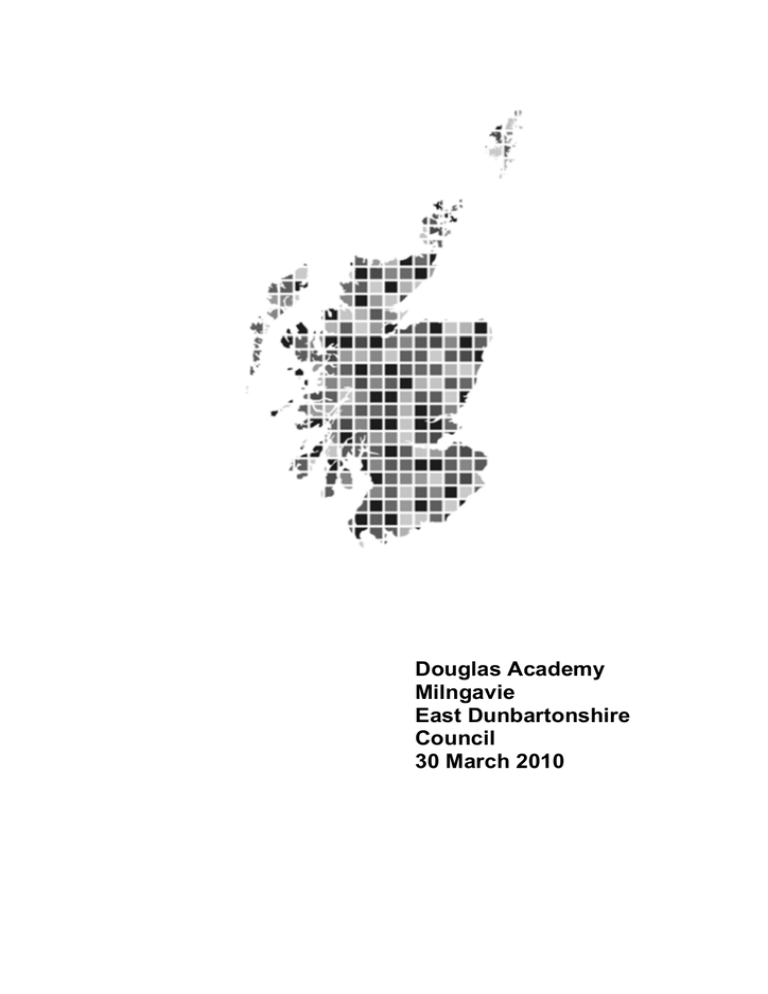
Douglas Academy Milngavie East Dunbartonshire Council 30 March 2010 HM Inspectorate of Education (HMIE) inspects schools in order to let parents1, young people and the local community know whether their school provides a good education. Inspectors also discuss with school staff how they can improve the quality of education. At the beginning of the inspection, we ask the headteacher and staff about the strengths of the school, what needs to improve, and how they know. We use the information they give us to help us plan what we are going to look at. During the inspection, we go into classes and join other activities which young people are involved in. We also gather the views of young people, parents, staff and members of the local community. We find their views very helpful and use them together with the other information we have collected to arrive at our view of the quality of education. This report tells you what we found during the inspection and the quality of education in the school. We describe how well young people are doing, how good the school is at helping them to learn and how well it cares for them. We comment on how well staff, parents and young people work together and how they go about improving the school. We also comment on how well the school works with other groups in the community, including services which support young people. Finally, we focus on how well the school is led and how staff help the school achieve its aims. If you would like to learn more about our inspection of the school, please visit www.hmie.gov.uk. Here you can find analyses of questionnaire returns from young people, parents and staff, and details about young people’s examination performance. We will not provide questionnaire analyses where the numbers of returns are so small that they could identify individuals. Where applicable there will also be a report on the learning community surrounding the school. 1 Throughout this report, the term ‘parents’ should be taken to include foster carers, residential care staff and carers who are relatives or friends. Contents 1. The school 2. Particular strengths of the school 3. How well do young people learn and achieve? 4. How well do staff work with others to support young people’s learning? 5. Are staff and young people actively involved in improving their school community? 6. Does the school have high expectations of all young people? 7. Does the school have a clear sense of direction? 8. What happens next? 1. The school Douglas Academy is a non-denominational school which serves the town of Milngavie and surrounding villages in East Dunbartonshire. The school incorporates The Music School of Douglas Academy, a national centre of excellence in music. Drawing young people from across the country, entry to The Music School is by audition. The roll was 988, including 45 in The Music School, when the inspection was carried out in February 2010. Around a quarter of those attending The Music School are accommodated in Dalrymple Hall. Young people’s attendance was in line with the national average in 2008/2009. 1 2. Particular strengths of the school • A strong ethos and welcoming environment for learning. • The confident young people and their very positive relationships with staff. • Young people’s attainment and achievement. • The care shown by staff to meet young people’s needs and to provide high-quality learning experiences. • The very wide range of experiences provided for young people to achieve success in sports and cultural activities. • Leadership of the headteacher and across the school. 3. How well do young people learn and achieve? Learning and achievement Young people are highly motivated and determined to do well. They are friendly, respectful and confident learners. Young people work well individually and engage very well in group activities in most subjects. They are developing very effective communication skills and informed attitudes. Young people respond well to the very wide range of learning experiences to learn in and out of the classroom. Relationships between young people and teachers are very positive. Almost all young people enjoy their learning and feel valued and well supported in school. In many lessons they discuss and evaluate their learning but this is not yet consistent across the school. 2 Across the stages, young people participate in a very wide range of activities to help them develop their skills and confidence. Large numbers of young people develop important team-working skills by taking part in choirs, orchestras and other musical groups. Many young people learn new sporting skills during regular activities and in residential experiences. A wide range of other activities, for example, debating and foreign visits help young people to develop confidence in communication skills. At S6, young people contribute well to the school and community. Some help younger learners in classes. The active eco group helps to ensure that young people are aware of important sustainability and environmental issues. Staff should build on existing good practice to ensure that all young people consistently receive credit for their achievements through accredited award programmes. At S1/S2, most young people achieve very well and reach consistently high standards in reading, writing and mathematics. Over recent years, young people’s attainment in English and mathematics has improved. In almost all subjects, young people are making good progress in classwork. Young people’s attainment at S4 is consistently well above the national average. It is much better than schools which serve young people with similar needs and backgrounds. Young people receiving additional support or at risk of missing out make sound progress. Young people’s performance in music has been consistently high. By the end of S6, young people’s attainment remains consistently well above national averages and is much better than in schools serving young people with similar needs and backgrounds. Young people achieve very well at Advanced Higher in a wide range of subjects. Curriculum and meeting learning needs The school provides young people with a broad range of courses and activities. Young people are given very good opportunities to develop a wide range of skills, to show leadership and to act responsibly. The Music School provides young people with very good opportunities to develop their musical abilities. Across the 3 school, staff should develop more consistent approaches to help young people build on their previous learning at primary school. At S1, the recent “Holocaust Memorial Day” helped young people to link their learning well across different subjects. At S3/S4, staff provide young people with appropriate chances to develop skills for work. At S5/S6, arrangements with neighbouring schools and local colleges provide young people with a wide range of choices. In a few subjects, young people’s choices, in moving from S4 to S5, are more limited. Staff should continue to develop the curriculum in line with Curriculum for Excellence. At some stages, the school does not yet provide young people with enough planned high-quality physical education and religious and moral education. Staff use many successful strategies for meeting young people’s learning needs. In almost all classes, teachers set tasks and activities at the right level of difficulty. Teachers explain work well and make good use of questions to check and develop young people’s learning. Support for learning staff provide very positive support for young people and teachers. They identify young people’s needs very effectively and work skilfully in helping young people with additional support needs. Support for learning staff share information well and provide teachers with helpful advice. Appropriate support plans are in place for young people with additional needs. Targets set within these plans, in a few cases, need to be clearer. Staff with pastoral care responsibilities know young people very well and provide very effective care and advice. Residential staff and tutors provide accommodated Music School pupils with very positive support. 4. How well do staff work with others to support young people’s learning? Staff work very well with others to support young people’s learning. A wide range of partner agencies provides strong support. These include the educational psychologist, social workers and residential staff at Dalrymple Hall. Partnerships with parents are very positive. 4 Almost all parents are happy with the school and feel it is helping their children effectively to develop confidence. Most feel well informed about the progress of their children. Parents feel that arrangements for them to give their views have improved. A few would like to have more regular opportunities to share their views. Most parents and young people feel that staff are good at dealing with any concerns or complaints. The Parent Council has appropriate opportunities for discussing important school priorities. It is working well with staff to support information events for all parents. 5. Are staff and young people actively involved in improving their school community? Staff and young people work very well to improve the school community. Most members of staff work together in Teacher Learning Communities to share and discuss good practice in teaching and learning. Most staff contribute effectively to the wide range of well-attended school activities. Many young people show care for others in the school and wider community. Almost all staff feel that they have good opportunities to be involved in developing the school’s priorities. Senior managers and principal teachers monitor young people’s attainment and progress very effectively. Any areas for improvement are identified and addressed. Arrangements for identifying strengths and weaknesses in learning are strong across the school. Staff should extend approaches to seek the views of young people, parents and partner organisations to identify areas for further improvement. 6. Does the school have high expectations of all young people? Staff and young people have very high expectations of success, based on a culture of high attainment and achievement and a very positive ethos. Young people feel strongly encouraged to do their 5 best and are treated fairly by staff and by each other. Behaviour across the school is very positive. Staff are aware of child protection procedures. Young people feel that the school encourages them well to make healthy lifestyle choices. Staff use a wide range of ways, including regular assemblies and concerts, to acknowledge and celebrate young people’s achievements. Staff have successfully reduced the number of young people being excluded from school to below the national average. 7. Does the school have a clear sense of direction? The headteacher provides very high-quality leadership. He has shared his vision for improvement and inclusion effectively and has gained the respect of parents, young people and staff. The headteacher has judged the pace of change well. He works successfully with his deputes and staff to lead and encourage important improvements. Together, they have maintained very high standards of attainment and achievement. School ethos has improved. Staff feel well supported and are very willing to take responsibility, for example, by leading working groups. They maintain very positive relationships with young people. The school has a very strong capacity for continued improvement. 8. What happens next? The inspection team was able to rely on the school’s robust self-evaluation. As a result, it was able to change its focus during the inspection to support further improvements within the school. The school provides a very good quality of education. Therefore, we will make no further visits in connection with this inspection. The education authority will inform parents about the school’s progress as part of the authority’s arrangements for reporting to parents on the quality of its school. 6 We have agreed the following areas for improvement with the school and education authority. • Continue to improve aspects of the curriculum in line with national guidelines and advice. • Continue to develop the role of young people, parents and community partners in the school improvement process. Quality indicators help schools, education authorities and inspectors to judge what is good and what needs to be improved in the work of the school. You can find these quality indicators in the HMIE publication How good is our school? Following the inspection of each school, the Scottish Government gathers evaluations of three important quality indicators to keep track of how well all Scottish schools are doing. Here are the evaluations for Douglas Academy. Improvements in performance Learners’ experiences Meeting learning needs very good very good very good We also evaluated the following aspects of the work of the school. The curriculum Improvement through self-evaluation HM Inspector: Alistair Brown 30 March 2010 7 good very good When we write reports, we use the following word scale so that our readers can see clearly what our judgments mean. excellent very good good means means means satisfactory weak unsatisfactory means means means outstanding, sector leading major strengths important strengths with some areas for improvement strengths just outweigh weaknesses important weaknesses major weaknesses If you would like to find out more about our inspections or get an electronic copy of this report, please go to www.hmie.gov.uk. Please contact us if you want to know how to get the report in a different format, for example, in a translation, or if you wish to comment about any aspect of our inspections. You can contact us at HMIEenquiries@hmie.gsi.gov.uk or write to us at BMCT, HM Inspectorate of Education, Denholm House, Almondvale Business Park, Almondvale Way, Livingston EH54 6GA. Text phone users can contact us on 01506 600 236. This is a service for deaf users. Please do not use this number for voice calls as the line will not connect you to a member of staff. You can find our complaints procedure on our website www.hmie.gov.uk or alternatively you can contact our Complaints Manager, at the address above or by telephoning 01506 600259. Crown Copyright 2010 HM Inspectorate of Education
